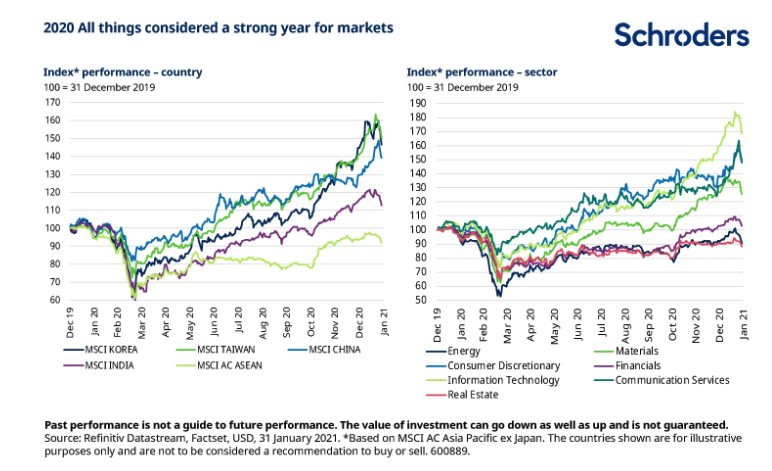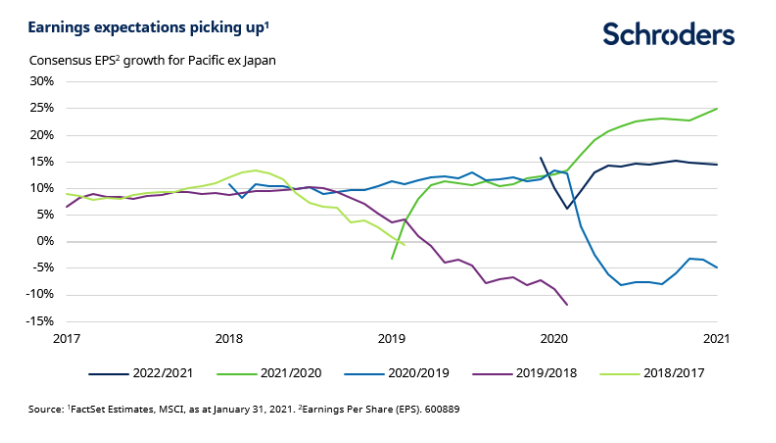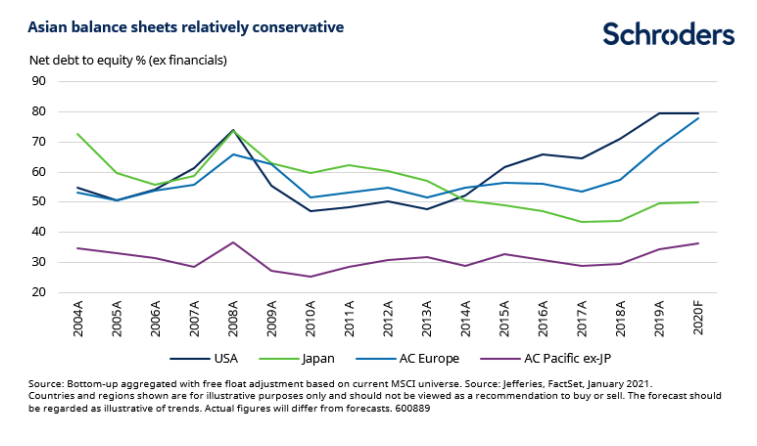
What is the post-pandemic outlook for Asian shares?

Despite the global turmoil caused by the Covid-19 pandemic, stock markets were generally strong in 2020 and the Asia ex Japan region was no exception.
Indeed, in many ways the region was first into the pandemic and first out, with successful containment of the virus in many countries enabling economic activity to resume more quickly than elsewhere in the world.
Diverging country and sector fortunes
While Asia fared well overall, what really stands out is the divergence in performance of different geographies and sectors. North Asian countries (China, South Korea, Taiwan), which generally had the greatest success in containing the pandemic, outperformed Indian and ASEAN stock markets.

And at sector level, strong demand for digital services and work from home devices helped shares of semiconductor suppliers and other technology companies to outperform. Other “pandemic winners” included e-commerce – part of the consumer discretionary sector – and communication services. Companies operating in these fields tend to be found in north Asia, thereby contributing to the strong performance from those countries.
By contrast, traditionally economically-sensitive sectors such as energy and financials lagged behind. These sectors tend to make up a higher proportion of the market in south and south-east Asia.
As 2020 progressed, optimism over swift economic recovery was joined by the very welcome news that successful vaccines had been discovered, and by the enormous levels of fiscal and monetary policy support coming from governments and central banks.
These factors continue to support markets in 2021, but as expectations for growth have gone up long term rates have also started to rise, which could impact markets.
Discover more from Schroders:
– Learn: What are the three ‘P’s of sustainable investing?
– Listen: Why the 21st century belongs to Asia
– Learn: FOMO market is over – what next?
Earnings expectations high but achievable
As a result of the rally in share prices, stocks are now looking quite expensive compared to their long run averages, at least when measured against historic earnings and book values (book value is the measure of a company’s assets, minus its liabilities). This suggest markets are pricing in quite a robust recovery in earnings.
Indeed, consensus expectations for corporate profits have been revised up sharply as confidence builds in the recovery and roll-out of the vaccines. For the Asia ex Japan region, market expectations are for around 25% earnings growth this year compared to 2020, and for 15% growth next year.

We don’t think these numbers are outlandish. However, much depends on the path of the pandemic, particularly how countries deal with any emerging new variants of the virus. That means there is perhaps a higher degree of uncertainty than usual around these forecasts of future profits. Given valuations, markets could be susceptible to disappointment on this front.
What’s more, there’s only so much that can be gleaned from looking at aggregates. As we saw in 2020, there can be significant divergences both between and within markets.
Is retail participation contributing to a bubble?
Another phenomenon that has helped to drive up markets globally in recent months is the large increase in retail investor activity. This has perhaps been more widely noted in the US, given the publicity around GameStop for example, but it’s in evidence in Asia too.
That increase in retail participation is perhaps a contributing factor to some of the more “bubbly” valuations we are seeing in certain parts of the market. Some of the “hot” areas of the market such as biotech, software, or electric vehicles are trading at or close to their historical peaks in terms of valuation multiples.
Some of these valuations are based on extremely high levels of prospective growth, often well out into the future, and are therefore very vulnerable to any change in sentiment or rise in interest rates.
By contrast, lowly valued sectors – banks, property, capital goods, utilities – have not caught the imagination of retail investors and that is partly why they look more cheaply valued overall right now.
Importance of active stock selection
For us, this demonstrates the importance of active stockpicking in this region. It’s important to be able to pick the overlooked areas which may have lagged but where recovery prospects are being under appreciated by the wider market.
By the same token, we’d want to avoid those areas with little margin of safety because the strong momentum they have enjoyed could very quickly go into reverse.
This applies to sectors and it applies to countries too. Relative growth could soon move in favour of south and south east Asia, which have lagged, compared to north Asia. This is a “catch-up play” as the recovery broadens out.
We would also point out that China has already made some moves towards tightening policy and talking down more speculative areas. We would expect government and central bank support and liquidity to start being withdrawn earlier in those countries that have already done well. It’s therefore very important to be active in asset allocation to take account of these kinds of divergences.
Asia remains attractive for income investors
We’d also highlight that, in our view, Asian stock markets are very well placed compared to the rest of the world in terms of income potential and the robust dividend streams that Asian companies offer.
It is partly a legacy of the Asian financial crisis that companies in the region went into the crisis with generally more conservative balance sheets than their peers in other regions. They also had more reasonable payout ratios, especially compared to those seen in places like the UK.

We therefore see no reason why dividends cannot recover along with earnings.
The value of investments and the income from them may go down as well as up and investors may not get back the amounts originally invested. Past performance is not a guide to future performance and may not be repeated.
– For more visit Schroders insights and follow Schroders on twitter.
Topics:
Important Information: This communication is marketing material. The views and opinions contained herein are those of the author(s) on this page, and may not necessarily represent views expressed or reflected in other Schroders communications, strategies or funds. This material is intended to be for information purposes only and is not intended as promotional material in any respect. The material is not intended as an offer or solicitation for the purchase or sale of any financial instrument. It is not intended to provide and should not be relied on for accounting, legal or tax advice, or investment recommendations. Reliance should not be placed on the views and information in this document when taking individual investment and/or strategic decisions. Past performance is not a reliable indicator of future results. The value of an investment can go down as well as up and is not guaranteed. All investments involve risks including the risk of possible loss of principal. Information herein is believed to be reliable but Schroders does not warrant its completeness or accuracy. Some information quoted was obtained from external sources we consider to be reliable. No responsibility can be accepted for errors of fact obtained from third parties, and this data may change with market conditions. This does not exclude any duty or liability that Schroders has to its customers under any regulatory system. Regions/ sectors shown for illustrative purposes only and should not be viewed as a recommendation to buy/sell. The opinions in this material include some forecasted views. We believe we are basing our expectations and beliefs on reasonable assumptions within the bounds of what we currently know. However, there is no guarantee than any forecasts or opinions will be realised. These views and opinions may change. To the extent that you are in North America, this content is issued by Schroder Investment Management North America Inc., an indirect wholly owned subsidiary of Schroders plc and SEC registered adviser providing asset management products and services to clients in the US and Canada. For all other users, this content is issued by Schroder Investment Management Limited, 1 London Wall Place, London EC2Y 5AU. Registered No. 1893220 England. Authorised and regulated by the Financial Conduct Authority.